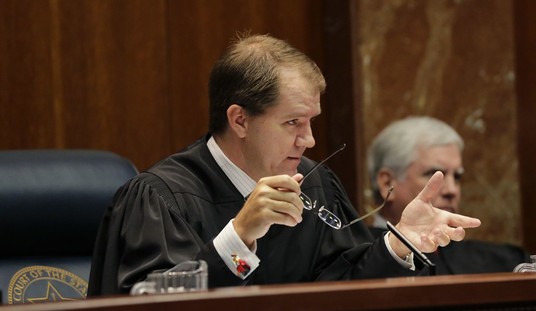A recent case from the New Jersey Court of Appeals is a perfect illustration of the violations of Second Amendment rights that take place on a regular basis in the state. The plaintiff, identified in court papers by the initials F.E., is a an Air Force veteran who carried a firearm regularly while serving in the military. Currently he’s a paramedic, and he’d like to be a gun owner. There’s just one problem; his local chief is denying him a Firearms ID card, which is a pre-requisite for legal gun ownership.
The chief is basing his denial on two incidents in F.E.’s past; a 1995 incident where the then 18-year old pleaded guilty to disorderly conduct, and a 2001 case involving a more serious offense.
He pleaded guilty to eluding police following a high-speed police pursuit after which he repeatedly refused demands by police to drop a knife he held in his hands, the ruling says.
“I was drinking and I was stupid. I have a lot of pent-up aggression,” he told police at the time, according to the ruling.
The plaintiff had his record expunged before he applied for a firearms purchaser identification card and two handgun purchase permits, but the Oakland police chief cited his prior arrests in denying him the permits. In New Jersey, you must get permission from your local police department to receive a firearm ID card.
When your criminal record is expunged, it basically means the conviction has been “set aside.” It’s not supposed to be a consideration of the courts going forward, yet the local police chief is still using these decades-old offenses to deny F.E. his right to keep and bear arms. Even worse, so far New Jersey’s courts have gone along with this travesty of justice.
The plaintiff appealed the chief’s decision to a trial court and lost there as well.
The lower court judge rejected the plaintiff’s argument that his expunged criminal record should not have been used to determine whether he should own a firearm, saying that while the incidents may not exist in the eyes of the law “the events which they concern and evidence do nonetheless have existence.”
The judge’s reasoning is essence, “the incidents don’t exist in the eyes of the law, except that they still do.” What a crock.
F.E. can legally purchase a gun in any state that doesn’t allow for local jurisdictions to circumvent the Second Amendment. He can serve in law enforcement. He could move to West Virginia or Vermont and not only legally own a gun, but carry it without a concealed carry license as well. He is no longer prohibited from owning firearms under federal law, only the capricious whims of the police chief.
Cases like F.E.’s aren’t unusual in New Jersey. Attorneys like Evan Nappen have entire practices devoted to helping clients deal with the state’s byzantine and onerous gun control laws, and there’s plenty of business, unfortunately. There is some reason to hope for improvement, however.
There’s a case out of New Jersey called Rogers v. Grewal that the Supreme Court has been holding in conference for several months now, and while that case deals with the discretionary issuing of concealed carry license, a ruling that strikes down the policy could also have an impact on the discretionary issuance of Firearms ID cards. If the Supreme Court accepts the arguments that led the Circuit Court of Appeals for the D.C. Circuit to strike down similar laws in Washington, D.C. in 2017 (D.C. decided not to appeal the decision) and rules that “may issue” laws for bearing arms violates the Constitution, then it stands to reason that “may issue” laws for keeping firearms violates the Second Amendment rights of Americans as well.
Before the Court decides whether or not to take up the Rogers case, it has to deal with the challenge to a NYC gun law that is already before the court. Oral arguments in New York State Rifle & Pistol Association v. New York City will be held on December 2nd, and many court watchers predict that the Court is hanging on to Rogers and several other cases for two reasons.
First, if the Court issues a decision in NYSPRA v. NYC that states gun laws must be looked at through the lens of “strict scrutiny”, or the highest level of judicial review, that could automatically impact Rogers and several other cases where courts have used “intermediate scrutiny” to uphold gun control laws. The Court may be holding on to these cases in order to send them back to lower courts once the decision involving the NYC gun law has been made official.
The justices could also be hanging on to Rogers in case they decide the NYC case is now moot, because the city has changed the law being challenged after the Supreme Court agreed to hear the case. Attorneys for the New York State Rifle & Pistol Association have argued that the changes don’t address all of the legal concerns, and that the city could revert back to the old policies if the Supreme Court decides to drop the case. So far the justices haven’t agreed to the attempts by the city to moot the case, but the topic is expected to be brought up at oral arguments in early December.
Unfortunately, New Jersey residents like F.E. can’t rely on any help from New Jersey politicians like Cory Booker or Phil Murphy. Nor have the state’s courts been helpful. If the Second Amendment is going to be restored in New Jersey, it’s likely going to take a couple of good SCOTUS decisions to make it a reality.









